UpStudy App is a popular AI-powered homework helper app (formerly “Camera Math Solver”) launched in 2020 by Crazysloth Pte. Ltd. It lets students snap a photo or type a question and get step-by-step solutions across subjects (Math, Physics, Chemistry, Biology, English, etc.). UpStudy also offers an AI tutor chat and connects to live tutors on demand. This article reviews UpStudy’s features, pricing, and user feedback, and compares it to alternatives like My Engineering Buddy.
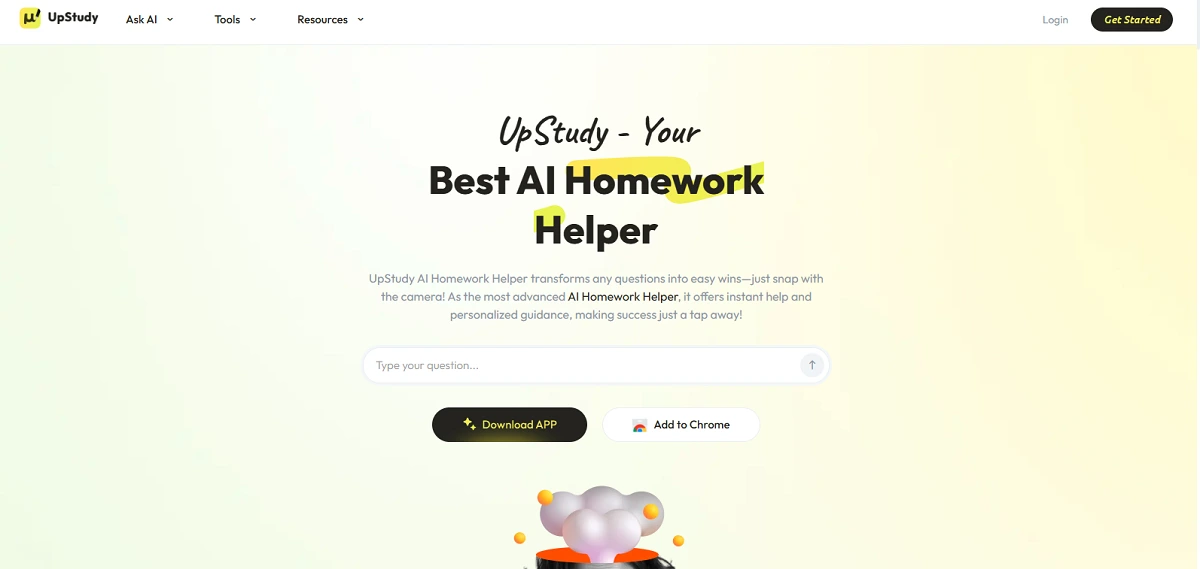
UpStudy Reviews and Testimonials
On Google Play, UpStudy has a 4.0/5 rating from over 72,300 reviews. (The App Store shows a similar 4.6/5 from recent reviews.) Users generally praise the app for clear explanations and quick help. For example, one student wrote that UpStudy “gives you the answers and explains how you get the answer” across different subjects. Reviewers say the photo-solver and AI tutor make studying easier. On the other hand, some users note issues: one said tutors sometimes take 6–8 hours to reply, and another complained that they must watch an ad for each problem to earn credits.
Is UpStudy legit? Yes. UpStudy is a genuine service used worldwide. It has been installed millions of times (5M+ downloads on Android) and was developed by an established company (Crazysloth, Singapore) in 2020. No credible source labels it a scam. Overall, student reviews are mixed but mostly positive: many mention helpful answers and 24/7 availability, while negative feedback highlights cost and response delays. In summary, UpStudy delivers on its promise of on-demand homework help, but it has limitations (see below).
UpStudy Pricing
Pricing Range
UpStudy offers a basic free tier and a paid Premium tier. The free (Basic) plan allows a limited number of free problem solves, but requires watching ads to earn “coins”. The Premium subscription unlocks unlimited solves, 24/7 AI and real tutor help, no ads, and extra tools (PDF Chat, daily quizzes, etc.) The Premium cost appears to be about $6.99 per week, based on the App Store (e.g. a “Weekly” plan at $6.99). Larger discounted packages (around $39–$70) may also be offered for multiple months.
What students say about UpStudy Pricing
Students have mixed views on the cost. Some feel it’s reasonable for 24/7 help, but others find it pricey. One App Store review noted UpStudy is “very very helpful but a little overpriced” and wished it were cheaper. Another student bluntly said the app “just asks for money” and often doesn’t help, reflecting frustration. In other words, many users acknowledge the value of instant answers, but some balk at the subscription fee. As one reviewer said, UpStudy is helpful but “a little overpriced”.
Hidden costs
Even with the free plan, there are indirect costs. For example, users earn solving credits (coins) by watching ads, which can be tedious: one reviewer complained they had to watch an ad for every question they needed help with. Also, the Premium subscription auto-renews each period unless cancelled. (UpStudy’s Terms confirm all subscriptions auto-renew unless ended 7 days before expiry.) Forgetting to cancel can lead to unexpected charges, as users have reported with similar tutoring apps. In short, students should be aware that free use comes with time costs (ads), and paid plans must be managed to avoid extra charges.
How UpStudy’s pricing works
In practice, you sign up and can try Premium on a short free trial (see below). After the trial, payment is charged to your account for the chosen plan. UpStudy’s App Store listing explains that subscriptions auto-renew unless cancelled 24 hours before the period ends. You can manage or cancel your subscription in your account settings. The Premium plan is charged up front (weekly or monthly), and there are no per-question fees once you are subscribed. Essentially, UpStudy is a flat-rate service: pay your subscription and get unlimited solves, AI chat, and tutor access for the term.
Free Trial
UpStudy offers a brief free trial of its Premium service. Early reports (and app descriptions) indicate a 3-day free trial is common. That means students can try premium features (unlimited solves, tutor help) for 3 days at no cost. After the trial, the weekly fee ($6.99) is charged. This aligns with one review: “After using the free trial for the premium version I am purchasing premium”. Always remember to cancel before the trial ends if you do not want to subscribe.
Refund policy
UpStudy’s official terms allow a refund request within 7 days of purchase or renewal. To get a refund, users must click ‘Request a Refund’ in their UpStudy account within that week. After 7 days, refunds are generally not granted. (Also note the terms warn against chargebacks or disputes, which can lead to account suspension.) In practice, students often rely on the app-store refund policies too: Google Play and Apple allow refunds under their own 48-hour or reasonable-use policies. But according to UpStudy’s own rules, act quickly: if you’re unsatisfied, request a refund within 7 days.
UpStudy Alternatives
Students and parents often compare UpStudy with other tutoring platforms. Some may seek alternatives due to cost, subject needs, or preference for live tutors. Key alternatives include:
- My Engineering Buddy (MEB): A live online tutoring service specializing in engineering and STEM subjects. Tutors work one-on-one with students on-demand. Pros: very high-quality tutoring and expert help (MEB has 97%+ satisfaction in reviews). It’s especially good for complex subjects. Cons: higher hourly fees and focus on engineering (less breadth in humanities). Many students who want personal attention choose MEB for its expert tutors.
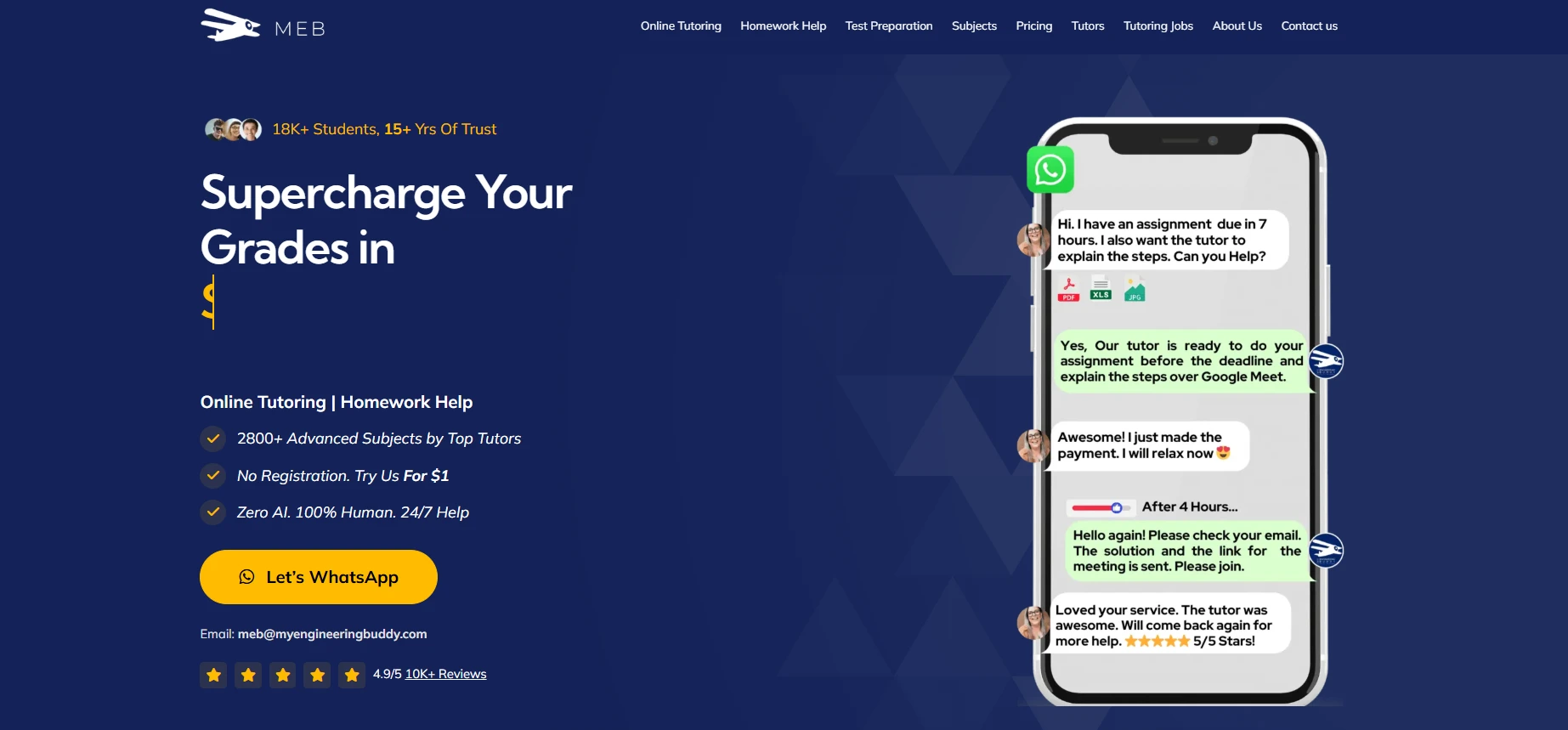
- Chegg Study: A large homework help platform. It offers step-by-step textbook solutions and 24/7 expert Q&A. Pros: huge subject library and tools (math solvers, writing help) for ~$16/month. It’s available globally. Cons: students report billing problems and occasional wrong answers. Chegg’s customer reviews cite unauthorized charges and quality issues. Chegg is legitimate and comprehensive, but some users advise caution with subscriptions.
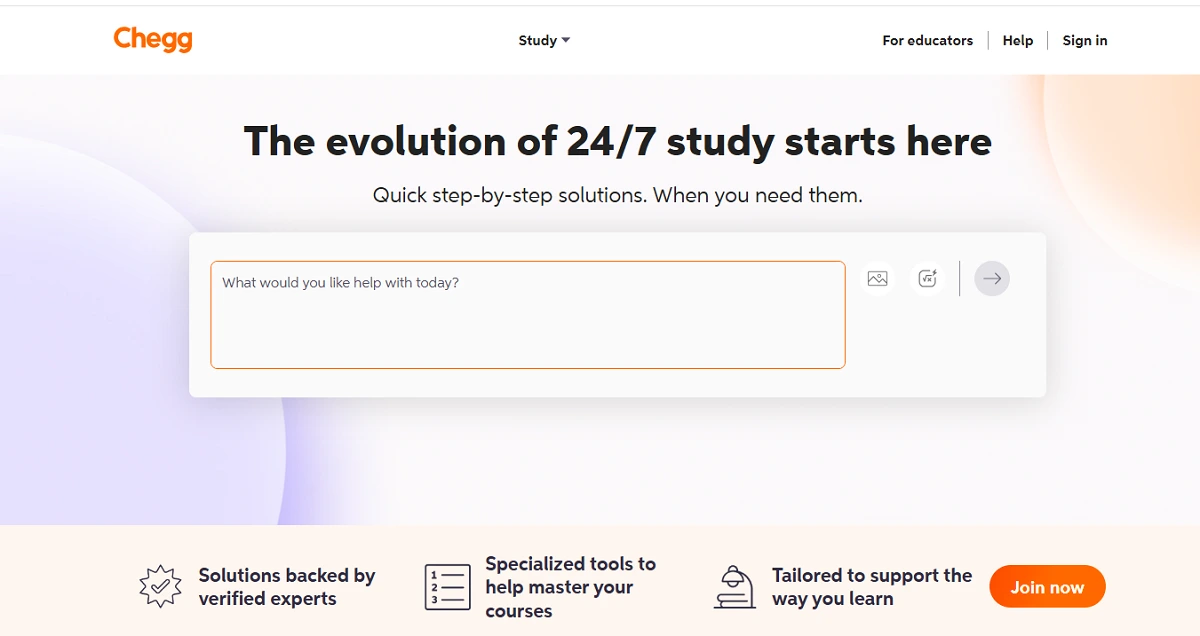
- Course Hero: A study resource site with millions of documents and a Q&A forum. Pros: massive library and answer-checking services. Typical plans are ~$39.95 for 3 months (~$13.30/mo). Cons: Uses “unlock” credits for each solution (you often must upload your own material or pay to unlock answers). Tutor answers on Course Hero can be slow or variable in quality. Course Hero can help when Chegg and UpStudy don’t, but it also has limits (credits, quality).
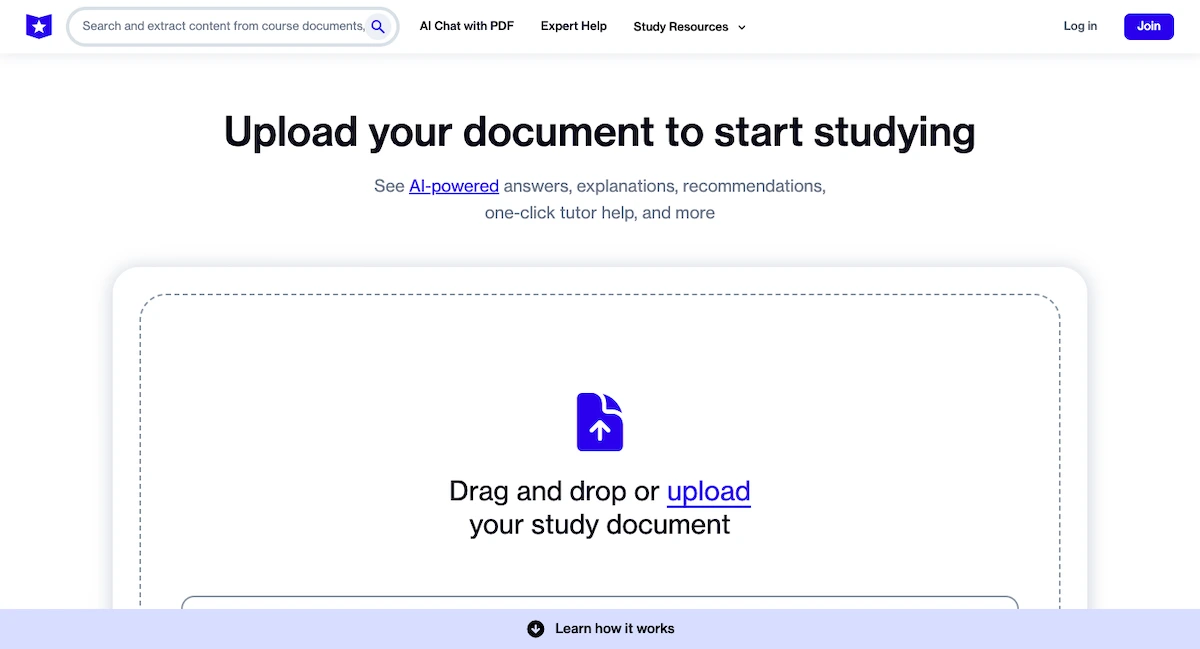
- Free Resources (Khan Academy, Brainly): For budget-conscious learners. Khan Academy provides free instructional videos and practice exercises (great for learning fundamentals, but no direct homework help). Brainly is a community Q&A platform where users answer each other’s questions. Pros: free and broad coverage. Cons: no guaranteed expert, no 24/7 help. These can supplement learning (and some students use them alongside UpStudy).
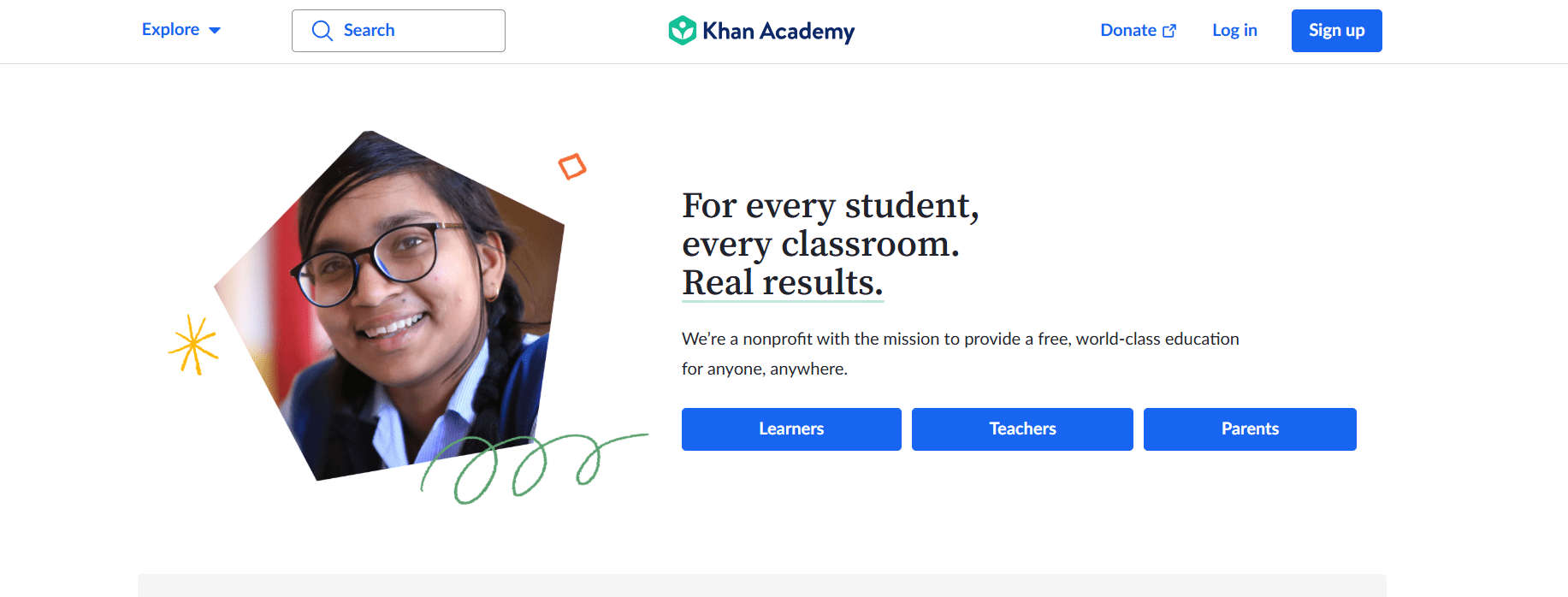
- Live Tutoring Sites (Wyzant, Tutor.com, etc.): Platforms that match you with a real tutor for live video sessions. Pros: personalized one-on-one teaching (often by experienced teachers). Cons: usually much more expensive on an hourly basis (e.g. $25–$60/hour) and require scheduling. For example, Wyzant and Tutor.com specialize in private tutoring. As one source notes: “If you want live teaching, go for Wyzant, Tutor.com, or MEB”. These may be preferred if UpStudy’s quick answers are not enough.
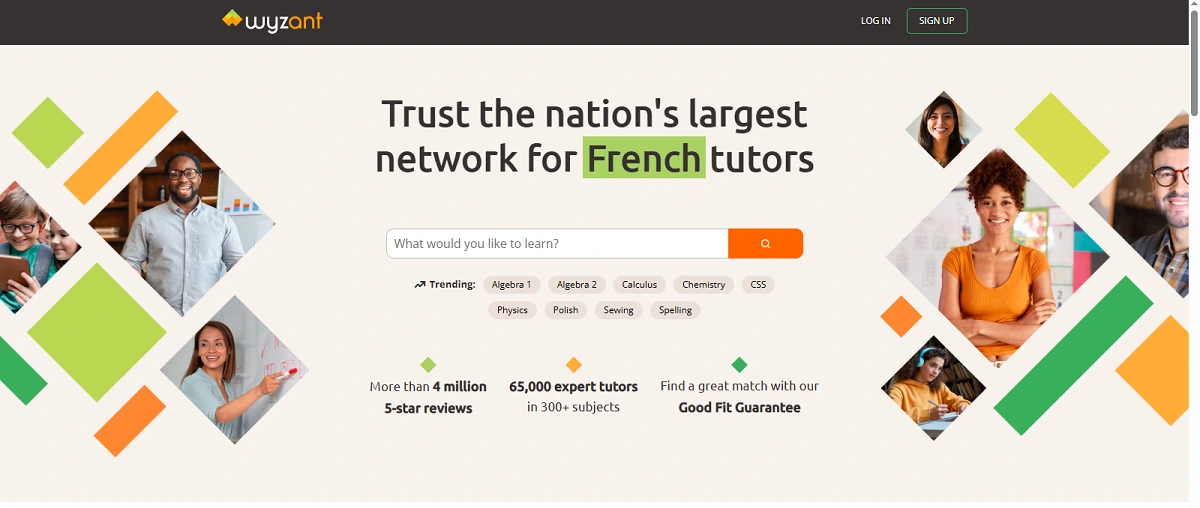
How it Works?
For Students
Students use UpStudy via the mobile app or website. To get help, you can snap a photo of a homework problem or type it in. The app’s AI solver then gives an immediate answer, often with a “Show steps” breakdown for understanding. If needed, you can continue asking follow-up questions. UpStudy covers many subjects (math, science, history, language, etc.) and even essay writing and quizzes. If the AI isn’t enough, students can connect to a live tutor through the app (UpStudy advertises “24/7 real tutor help”) In practice, users report that UpStudy usually provides quick solutions, but occasionally you might wait for a tutor’s answer. Overall, UpStudy is designed to make homework faster: take a question, get an answer and explanation, and move on with your study.
For Tutors
UpStudy also involves human tutors. The platform allows tutors to solve students’ questions for pay. While UpStudy doesn’t publicly detail tutor pay rates, user reviews imply tutors earn by answering problems. One student said they “send any problem to a tutor and they will solve it showing the steps”. The app’s interface suggests each question is answered by a tutor (which presumably earns a commission to the tutor). To become a tutor, one would likely register on UpStudy and specify your subject expertise (similar to other Q&A tutoring sites). Tutors on UpStudy should aim to reply quickly and clearly: one review noted that waiting 6–8 hours for an answer is a drawback. We did not find official data on tutor earnings or hours. In general, as with similar platforms, tutors compete by providing fast, accurate solutions. Getting students likely depends on your rating and responsiveness. According to UpStudy’s app listing, the Premium plan includes “unlimited real tutor help”, indicating strong demand for tutors, but details on fee setup and payouts remain unspecified by UpStudy.
FAQs About UpStudy (including comparison to My Engineering Buddy)
Is UpStudy legitimate? Yes. UpStudy is a real, functional service. It has millions of downloads and is run by a registered company. It’s not a scam; instead, it’s a fast-growing homework app (an analysis reported it earned ~$70K/month by 2024). Students use it widely, and it delivers on solving questions with AI and tutors. However, “legit” doesn’t mean flawless: users should be mindful of costs and verify any critical answers.
How does UpStudy compare to My Engineering Buddy (MEB)? UpStudy is an AI-driven homework solver app, while My Engineering Buddy is a human tutoring service. UpStudy focuses on instant answers via camera scan, AI chat (“Thoth”), and on-demand tutors. MEB provides scheduled live 1:1 tutoring by expert teachers (especially for engineering and STEM). Pros of UpStudy: immediate solutions, wide subject range, mobile convenience. Pros of MEB deep personalized teaching and expert guidance. Cons of UpStudy: subscription cost and sometimes slower tutor replies. Cons of MEB higher hourly fees and a narrower focus (mostly STEM). Many students choose UpStudy for quick self-serve help, while others pick MEB for hands-on, individual tutoring.
What subjects does UpStudy cover? UpStudy covers a broad range: math (algebra, calculus, etc.), physics, chemistry, biology, history, geography, and language arts (writing, essays). It also has extra tools like geometry calculators and daily quizzes. However, it may be weakest in very specialized fields outside those listed. MEB, by contrast, focuses on engineering, math and science courses, offering live help on those topics.
How do I cancel or get a refund? To cancel UpStudy Premium, you must do so at least 24 hours before the end of the billing cycle (via your account settings). The service auto-renews otherwise. If you want a refund, UpStudy’s policy is to request it within 7 days of purchase/renewal. After that window, refunds are not guaranteed. In practice, use the app-store or Google Play refund features for faster help (some users report success with those). The official terms say chargebacks violate the agreement and can get your account locked. So, cancel early if needed.
UpStudy: Company Information
Founding & Background: UpStudy was launched in late 2020 as “Camera Math Solver” by Crazysloth Pte. Ltd. (a Singapore-based company). It quickly gained traction: by mid-2024 it was reportedly making ~\$70K per month and getting 45K new installs each month. The main developer email (support@cameramath.com) and office address (Singapore) are listed on its app pages.
Founders & Team: Public details on the founders aren’t widely published. The app’s publisher is Crazysloth Pte. Ltd. The team likely includes developers and a growing tutor community. UpStudy’s Glassdoor or LinkedIn profiles haven’t yielded clear info. (Some related names like “Crazy Maple Studio” appear, but no confirmed link.)
Mission & Vision: UpStudy’s goal is to “turn homework headaches into learning moments.” It markets itself as giving students personalized, on-demand help. An editorial review describes UpStudy as providing “immediate access to expert tutors across subjects” along with “interactive learning tools” and AI to make learning easier. The app’s vision seems to be blending AI and human tutoring: its AI (“Thoth”) can even write short essays, reflecting a push towards an all-in-one study tool.
Scale of operations: UpStudy is a global app. It has 5+ million Android installs and is available on iOS in many countries (the App Store listing shows it in multiple regions). The app and website support multiple languages (English, Spanish, and even Chinese, French, etc. are listed). While no official user count is given, its high download figures and top Education ranking indicate a large user base. UpStudy markets itself to students in wealthy countries and beyond (US, UK, Canada, Gulf states, Australia, etc.), though any specific user demographics aren’t published.
Services offered: UpStudy’s services include:
- Instant Answer Engine: Snap or type any homework question and get an AI-generated solution (including step-by-step math solutions).
- AI Tutor Chat: A chat interface (“Thoth”) for follow-up questions, concept explanations, and even essay writing.
- Live Tutor Help: Access to real human tutors 24/7 for more complex questions (a Premium feature).
- Specialized Tools: Built-in calculators (geometry, statistics, etc.), quizzes, and learning modules for exam prep.
- Homework Management: The app can save problem history for review and has a clean, user-friendly interface (discussed by app analysts).
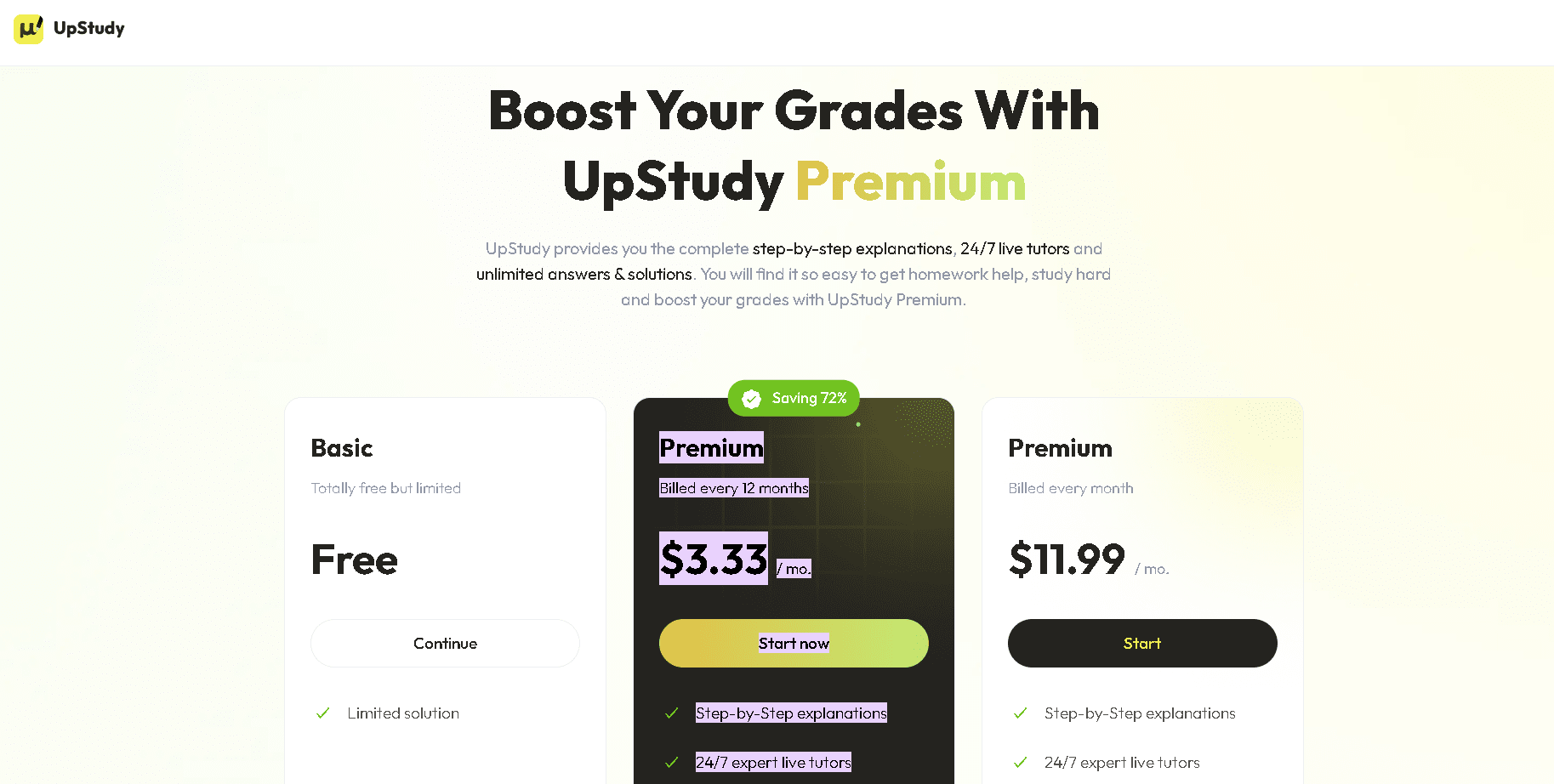
Subjects covered: UpStudy covers standard school and college topics. On math it handles algebra, geometry, calculus, trigonometry, statistics, etc. For science it has physics, chemistry, and biology. In humanities it covers English (writing help) and social sciences (history, geography). It boasts a “wide range of subjects” overall. Compared to MEB (mostly engineering and math), UpStudy is broader but still focused on academic subjects that benefit from step-by-step answers.
Unique features: Key USPs (Unique Selling Points) of UpStudy include:
- Image Recognition Solver: The ability to photograph math or physics problems and get instant solutionsThis camera-based solving is a standout feature not found in all competitors.
- AI Integration: Beyond simple solvers, UpStudy has an AI chat (“Thoth”) that can tackle follow-up questions and even write small essays. This broadens the tool beyond just numeric answers.
- 24/7 Tutor Access: Even though it’s an app, UpStudy promises around-the-clock access to real tutors (if you pay). That hybrid AI + human model is a differentiator.
- Daily Microlearning: The app includes personalized daily study routines and quizzes to keep students engaged (advertised in app description).
- Sleek UX: Analysts note the polished design and smooth onboarding (asking your name, granting camera access, etc.) which helps engage students and justify the premium cost.
USP of UpStudy
In short, UpStudy’s unique angle is its combination of instant AI help and human tutors. Its core “Aha!” moment is snapping a question and getting an answer immediately. It covers more than just math by integrating writing and practice quizzes. Few apps offer both AI problem-solving and live tutors in one package. This makes UpStudy stand out as an “all-you-need” homework app – especially since it works as a mobile app with camera support (unlike text-only sites).
Drawbacks of UpStudy
However, UpStudy has downsides. The price is high: after a short trial, it charges about \$6.99/week, which many users find steep (even one reviewer called it “overpriced”. Another issue is the free-user experience: needing to watch an ad for each question can frustrate students (as one user mentioned. Also, while the AI solver is strong in math, some subjects or complex problems might still require patience, and tutor responses can be delayed (e.g. waiting hours). UpStudy’s focus is on certain subjects and grades; if a student needs help in, say, foreign language grammar beyond English or K-12 arts subjects, UpStudy may not cover it well. Finally, customer support relies on email (support@upstudy.ai) and automated replies, so personal help for technical issues may be limited.
Comparison with My Engineering Buddy
My Engineering Buddy (MEB) is often suggested as an alternative. The core difference is human vs AI. UpStudy is largely self-service (you use the app/AI and get answers instantly), whereas MEB provides live 1:1 tutoring. For example, a student who needs step-by-step math solutions might use UpStudy on the spot. A student struggling with advanced engineering concepts might prefer MEB’s personal tutor sessions. UpStudy’s USP is speed and convenience; MEB’s is depth of instruction and expert tutors. In reviews, UpStudy is noted for its fast answers, while MEB is praised for “high-quality services” and tutoring experts. Pricing also differs: UpStudy charges a flat weekly/monthly fee, whereas MEB tutors typically charge per session (often comparable or higher per hour). If you want quick homework help at any time, UpStudy can be better. If you want guided study and are willing to pay more, MEB is a strong choice:contentReference[oaicite:92].
Customer Support and Policies
UpStudy’s support contact is listed as an email (support@upstudy.ai), and its website has a FAQ. The Terms of Service cover its policies subscriptions auto-renew (cancel 7 days before end) and refunds are only granted if requested within 7 days. It explicitly warns against payment disputes (“chargebacks”). On app stores, UpStudy also has a privacy policy and accepts standard payment methods. There is no toll-free support line – help is through email and the app’s built-in messaging. Students concerned about billing should read the Terms and monitor their subscription settings.
Global Reach and Localization
UpStudy is aimed at students worldwide. The app has been translated into multiple languages (English, Spanish, Chinese, etc.), and the website offers English and Spanish interfaces. The Google Play listing is available globally, and the App Store listing supports many regions. According to the MEB website, UpStudy targets users in the USA, UK, Canada, Gulf countries, Australia, and more (similar markets where MEB advertises). In practice, UpStudy seems to have a broad international user base, though its main content is English. Localization appears limited to language translation; there are no specific country or curriculum customizations mentioned.
UpStudy’s future plans (including use of AI)
UpStudy continues to evolve its AI. The latest versions emphasize the AI tutor (“Thoth”) and personalized study plans. For instance, the app now generates daily microlearning content and supports essay writing with AI. The company seems focused on building more AI features – possibly adding more subject bots or smarter help – while also expanding the live tutor network (they say they hire more 24/7 tutors). A 2025 update (“Version 3.4.9”) thanked users for feedback, implying frequent updates. Given industry trends, UpStudy may further integrate large-language models or more interactive study tools. However, no official roadmap is public. Users can expect incremental improvements to the AI solver and maybe new subjects over time.
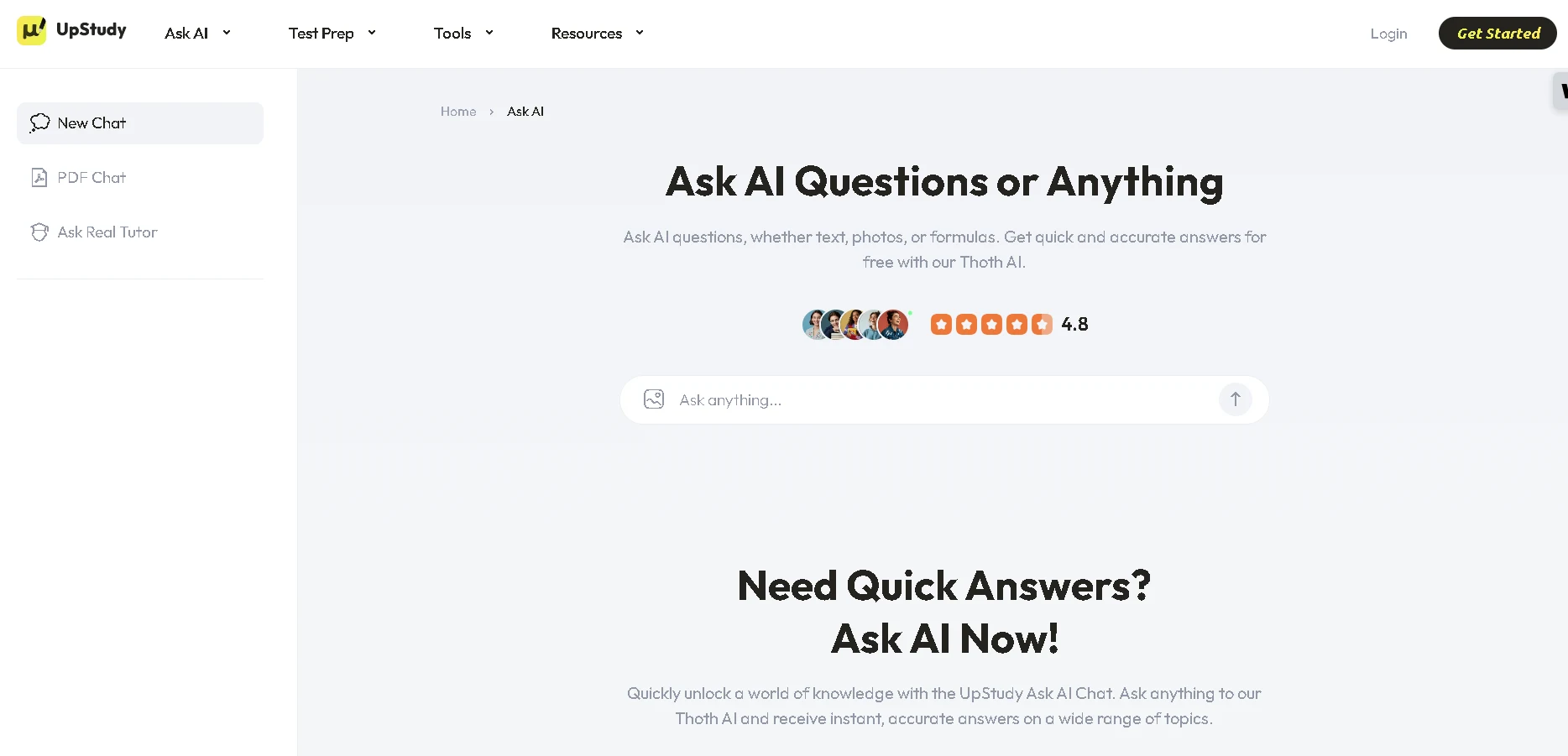
FAQs About UpStudy
Is UpStudy legit or a scam? It is a legitimate app with a large user base. As noted, it has millions of downloads and positive feedback on major stores. It is not a scam; it delivers real answers via AI and tutors. However, its value depends on personal needs (some users find it expensive or imperfect). Always review your subscription carefully.
How do I compare UpStudy to My Engineering Buddy? In brief, UpStudy is app-based AI homework help, while My Engineering Buddy is live tutoring. UpStudy is self-serve (snap a photo, get an answer) and covers many subjects. MEB assigns a human tutor to teach you through complex engineering or math problems in live sessions. UpStudy is faster and may cost less for casual use. MEB provides more personalized teaching (reflected in its high ratings).
What if I need a subject UpStudy doesn’t cover? UpStudy is strongest in core subjects (math, science, English). If you need help in an unsupported area (like foreign language or art), you might try a human tutor (like MEB or a local tutor) or other online services. For general learning, free resources like Khan Academy or YouTube can help supplement.
Can I use UpStudy offline? No. UpStudy relies on cloud AI and tutor networks, so you must have an internet connection to get answers and chat with tutors.
Customer Support: For technical help or billing issues, contact support@upstudy.ai (as listed in the app). Read the Terms for subscription details. Because UpStudy is a digital service, refunds and cancellations must go through the account settings or email support.
Conclusion
UpStudy’s strength lies in its AI-driven instant help and wide subject coverage. It can be a powerful study aid with its camera solver, thorough explanations, and on-demand tutor chats. According to user feedback, students appreciate the step-by-step answers and flexibility, but often point out that the service can be slow (tutor wait times) and is somewhat pricey. In summary, UpStudy offers convenient homework assistance, but it is not a magic bullet: you still need to review the solutions and manage your subscription.
As an alternative, My Engineering Buddy is recommended for those who prefer personalized human tutoring, especially in engineering/STEM. MEB has a proven track record of high-quality, one-on-one tutoring and high satisfaction. It is typically more expensive on a per-session basis, but many find its custom teaching style worth the cost. Whether to use UpStudy or MEB depends on your needs: choose UpStudy for quick, on-the-go answers and MEB for deeper live instruction. Both are legitimate services serving similar student communities. Ultimately, this comparison shows UpStudy’s niche (AI/app-based help) and MEB’s niche (personal tutoring), giving students multiple ways to get homework help.
******************************
This article provides general educational guidance only. It is NOT official exam policy, professional academic advice, or guaranteed results. Always verify information with your school, official exam boards (College Board, Cambridge, IB), or qualified professionals before making decisions. Read Full Policies & Disclaimer , Contact Us To Report An Error
